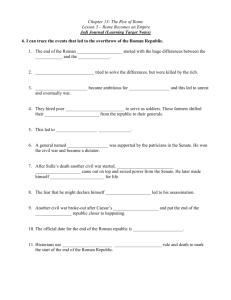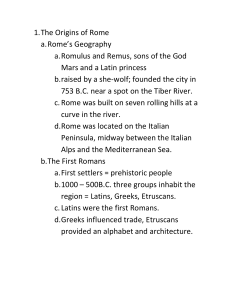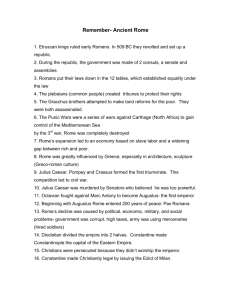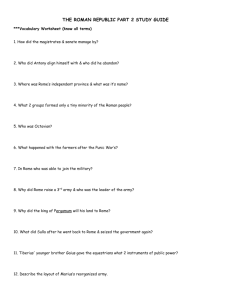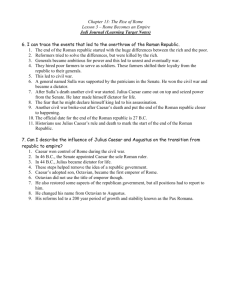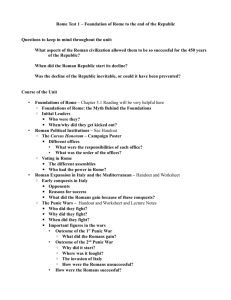Chapter 4
advertisement
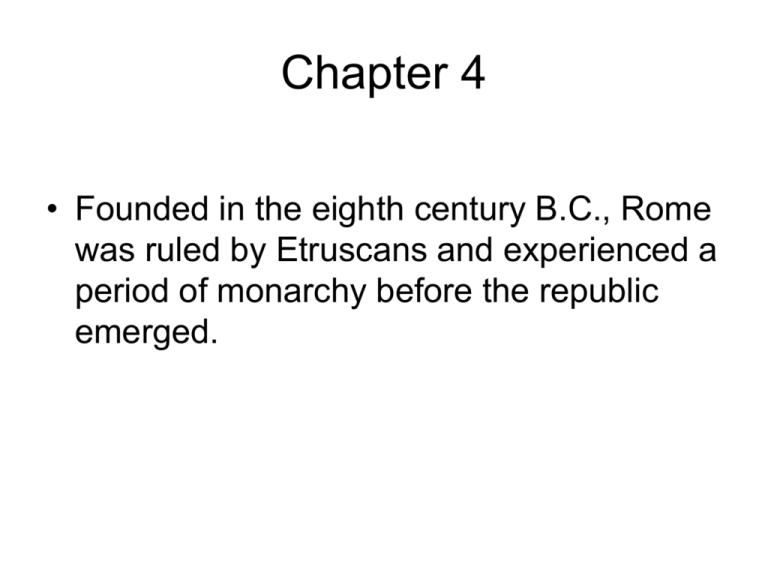
Chapter 4 • Founded in the eighth century B.C., Rome was ruled by Etruscans and experienced a period of monarchy before the republic emerged. The Rise of Rome, 753-265 B.C. • A Great City is Founded – Geography • Rome was located on hills overlooking a fertile low-lying plain and the Tiber River • The Etruscan Influence • The Roman Monarchy, ca. 753-509 B.C. – Overthrow of Etruscans • Sextus, son of the Etruscan king Tarquin the Proud, raped Lucretia at knifepoint and she committed suicide • The Etruscan monarchy was overthrown The Rise of Rome, 753-265 B.C. • Governing an Emerging Republic – Struggle of Orders • A series of political reforms from 509 to 287 B.C. • The poor wanted guarantees against the abuses of the powerful • The wealthy plebeians wanted a role in government – Governing the Republic • Laws passed by the Tribal Assembly did not need Senate approval • Three main social classes: Patricians, Wealthy Plebeians, and Poor Plebeians • Informal Governance: Patrons and Clients The Rise of Rome, 753-265 B.C. – Clients’ Role • Consisted of people from all walks of life who looked to powerful patrons for help in their careers • Clients received ritual gifts • The patron was supposed to exert a moral authority over his clients, helping them to be good citizens • Dominating the Italian Peninsula – Italian Wars • The Latin League - Romans were united by fellow Latin tribes in religious and military ties • Two years later, Rome defeated the allies and dissolved the League Chapter 4 – Foreign Policy • Most of their success came from their generosity in victory • Romans allowed all the tribes to retain full autonomy in their own territories and to elect their own officials, keep their own laws, and collect their own taxes. • The Romans valued piety and moral seriousness and made the family the center of urban social life. Family Life and City Life • A Pious, Practical People • Loyalty to the Family – Marriage Patterns • Marriages were arranged, a woman could be given in two ways. • Her family might transfer her to her husband’s control, or she might remain under her father’s hand • The Challenges of Childhood – Child-Rearing Practices • Newborns were bound in strips of cloth for two months to ensure that their limbs would grow straight • Many physicians recommended that children begin to drink sweet wine at six months Family Life and City Life – Child-Rearing Practices (cont.) • Fewer than half of the newborns raised reached puberty • At the age of six or seven, children were put in the care of tutors • By twelve, boys graduated to higher schooling • Life in the City – Life in the Forum • The Forum was the economic, social center, and the political center • In the afternoon, work ceased and the men headed for the baths, and the late afternoon and evening it was time for leisure – Diet • Men dined reclining on couches, and women and children are seated in chairs • Bread, porridge, vegetables mixed with oil, and wine Chapter 4 • The success of Rome’s army eventually brought changes, positive and negative, to Roman Society. • The Romans’ Victorious Army – Weapons and Discipline • All soldiers took an oath binding themselves to the army until death or the end of the war Expansion and Transformation, 265-133 B.C. • Wars of the Mediterranean – First Punic War • Rome’s clash with Carthage began over who would control Messana – New Roman Navy • Before the Romans, the basic tactic at sea was ramming one ship into another, but they developed a new vessel that featured a special platform that allowed many infantrymen on board to fight hand to hand. – Second Punic War • Over who would control the city of Saguntum • General Hannibal and Publius Cornelius Scipio • Scipio decisively defeated Hannibal at the Battle of Zama in 202 B.C. Expansion and Transformation, 265-133 B.C. – Third Punic War • Cato the Elder tried to spur his countrymen to resume the fighting against Carthage • Rome crushed the city of Carthage in 146 B.C. – Eastern Conquests • An Influx of Slaves – Slave Occupations • In the cities, slaves and citizens often worked in the same occupations, and all could earn money through their labor • The most undesirable jobs were generally reserved for slaves Expansion and Transformation, 265-133 B.C. – Slave Revolts • Between 73 and 71 B.C. the gladiator Spartacus and his army of almost 70,000 slaves ravaged portions of Italy. • Economic Disparity and Social Unrest – New Poverty • The population swelled with propertyless day laborers Chapter 4 • Republican armies conquered some of the great Hellenistic cultural centers which brought an influx of Hellenistic ways to Rome. – Resisting Change Hellenizing of the Republic • Roman Engineering: Fusing Utility and Beauty – Engineering • Romans had learned much about engineering from the Etruscans – Aqueducts • Brought water from rivers or springs into cities • Concrete: A New Building Material – Pantheon • A temple dedicated to all the gods, built in A.D. 125 Hellenizing of the Republic • Latin Comedy and the Great Prose Writers, 240-44 B.C. – Cicero • Defined Latin literature – Caesar’s Writings • Commentaries Chapter 4 • An economic downturn, which some leaders tried to prevent with reforms, led to a decay in the political life of the Roman republic, as political murder and dictatorship became common. The Twilight of the Republic, 13344 B.C. • The Reforms of the Gracchi, 133-123 B.C. – Tiberius’s Reforms • Proposed an agarian law that would redistribute public land to landless Romans • Some senators beat Tiberius and 300 of his followers to death – Gaius’s Reforms • Tiberius’s brother built granaries, roads, and bridges to improve the distribution of grain into the city • Populares vs. Optimates: The Eruption of Civil Wars, 123-46 B.C. The Twilight of the Republic, 13344 B.C. – Marius • The first general to come to power based on the support of the army • He created a professional army, put the soldiers on the payroll, and cultivated an army with many rootless and desparate men who were loyal only to him • Defeated first the Numidians in Africa, and then the Celts to the north – Sulla • Commanded six legions in the final stages of the Italian wars, and his successes earned him a governorship in Asia • Sulla defeated Mithridates The Twilight of the Republic, 13344 B.C. – First Triumvirate • Was made up of three men who appealed to various sectors of Roman society • Pompey, Julius Caesar, and Crassus • Julius Caesar, 100-44 B.C. – Civil War • War between Caesar and Pompey began in 49 B.C. • After losing a decisive battle in Greece in 48 B.C., Pompey fled to Egypt where he was assassinated • In 46 B.C. Caesar returned to Rome The Twilight of the Republic, 13344 B.C. – Political Titles • Caesar accepted the title of “dictator” in 48 B.C., and proclaimed himself “dictator for life” • Caesar had his image placed on coins – Conspiracy • Many Romans were outraged by the honors Caesar took for himself • Sixty senators entered into a consiracy to murder their leader – Caesar’s Murder • On March 15, the “ides,” assassins surrounded the dictator as he approached the Senate meeting place; they drew knives and plunged them into his body
